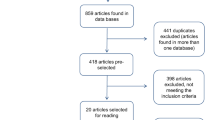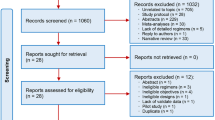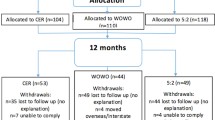Abstract
Background
Intermittent dieting may be an alternative to continuous dieting for weight reduction.
Objective
To evaluate the effect of intermittent dieting versus continuous dieting on weight and body composition in overweight or obese adults.
Design
A systematic review and meta-analysis of randomized controlled trials (RCTs). Five databases were searched until February 2018 for RCTs comparing intermittent versus continuous dieting. Intermittent dieting consisted of two types: regular intermittent was caloric restriction interspersed with days of weight maintenance or ad libitum eating; intensified intermittent was caloric restriction interspersed with days of even lower caloric restriction. Continuous was continual caloric restriction. Primary outcomes were weight, body fat, lean mass, waist circumference, hip circumference, and energy expenditure. Data were pooled by the inverse variance method using random-effects models and expressed as mean differences (MD) and their 95% confidence intervals (CI).
Results
Nine trials met the inclusion criteria (n = 782), six comparing regular intermittent vs continuous (n = 553), and three comparing intensified intermittent vs continuous (n = 229). Populations were heterogeneous: obese only in five studies, and overweight or obese (mixed) in four studies. Lean mass was significantly lower in regular intermittent vs continuous (MD −0.86 kg; 95% CI −1.62 to −0.10; p = 0.03). No differences were found for the remaining outcomes for both comparisons (regular intermittent or intensified intermittent vs continuous). There was low heterogeneity of effects across trials. Subgroup effects by time to follow-up, gender, per-protocol versus intention-to-treat, enforced exercise, and diabetes were similar to main analyses.
Conclusions
This systematic review in obese and overweight individuals showed that regular intermittent dieting decreased lean mass compared to continuous dieting. There were no differences in effects for either intermittent vs continuous interventions across all other outcomes. In contrast to previous systematic reviews, this study suggested that lean mass is better preserved in continuous dieting compared to regular intermittent dieting.
This is a preview of subscription content, access via your institution
Access options
Subscribe to this journal
Receive 12 print issues and online access
$259.00 per year
only $21.58 per issue
Buy this article
- Purchase on Springer Link
- Instant access to full article PDF
Prices may be subject to local taxes which are calculated during checkout





Similar content being viewed by others
References
Jensen MD, Ryan DH, Apovian CM, Ard JD, Comuzzie AG, Donato KA, et al. 2013 AHA/ACC/TOS guideline for the management of overweight and obesity in adults: a report of the American college of cardiology / American heart association task force on practice guidelines and the obesity society. Circulation. 2014;129(25Suppl 2):S102–38.
Bangalore S, Fayyad R, Laskey R, DeMicco DA, Messerli FH, Waters DD. Body-weight fluctuations and outcomes in coronary disease. N Engl J Med. 2017;376:1332–40.
Tremblay A, Royer MM, Chaput JP, Doucet E. Adaptive thermogenesis can make a difference in the ability of obese individuals to lose body weight. Int J Obes. 2013;37:759–64.
Byrne NM, Sainsbury A, King NA, Hills AP, Wood RE. Intermittent energy restriction improves weight loss efficiency in obese men: the MATADOR study. Int J Obes. 2018;42:129–38.
Wing RR, Blair E, Marcus M, Epstein LH, Harvey J. Year-long weight loss treatment for obese patients with type II diabetes: does including an intermittent very-low-calorie diet improve outcome? Am J Med. 1994;97:354–62.
Liberati A, Altman DG, Tetzlaff J, Mulrow C, Gotzsche PC, Ioannidis JP, et al. The PRISMA statement for reporting systematic reviews and meta-analyses of studies that evaluate health care interventions: explanation and elaboration. PLoS Med. 2009;6:e1000100.
Higgins JP, Altman DG, Gotzsche PC, Juni P, Moher D, Oxman AD, et al. The Cochrane Collaboration’s tool for assessing risk of bias in randomised trials. BMJ. 2011;343:d5928.
Bucher HC, Guyatt GH, Griffith LE, Walter SD. The results of direct and indirect treatment comparisons in meta-analysis of randomized controlled trials. J Clin Epidemiol. 1997;50:683–91.
Higgins JP, Thompson SG, Deeks JJ, Altman DG. Measuring inconsistency in meta-analyses. BMJ. 2003;327:557–60.
Ash S, Reeves MM, Yeo S, Morrison G, Carey D, Capra S. Effect of intensive dietetic interventions on weight and glycaemic control in overweight men with Type II diabetes: a randomised trial. Int J Obes Relat Metab Disord J Int Assoc Study Obes. 2003;27:797–802.
Viegener B, Perri M, Nezu A, Renjilian D, McKelvey W, Schein R. Effects of an intermittent, low-fat, low-calorie diet in the behavioral treatment of obesity. Behav Ther. 1990;21:499–509.
Harvie M, Wright C, Pegington M, McMullan D, Mitchell E, Martin B, et al. The effect of intermittent energy and carbohydrate restriction vs. daily energy restriction on weight loss and metabolic disease risk markers in overweight women. Br J Nutr. 2013;110:1534–47.
Wing RR, Jeffery RW. Prescribed “breaks” as a means to disrupt weight control efforts. Obes Res. 2003;11:287–91.
Harvie MN, Pegington M, Mattson MP, Frystyk J, Dillon B, Evans G, et al. The effects of intermittent or continuous energy restriction on weight loss and metabolic disease risk markers: a randomized trial in young overweight women. Int J Obes. 2011;35:714–27.
Keogh JB, Pedersen E, Petersen KS, Clifton PM. Effects of intermittent compared to continuous energy restriction on short-term weight loss and long-term weight loss maintenance. Clin Obes. 2014;4:150–6.
Carter S, Clifton PM, Keogh JB. The effects of intermittent compared to continuous energy restriction on glycaemic control in type 2 diabetes; a pragmatic pilot trial. Diabetes Res Clin Pract. 2016;122:106–12.
Davis CS, Clarke RE, Coulter SN, Rounsefell KN, Walker RE, Rauch CE, et al. Intermittent energy restriction and weight loss: a systematic review. Eur J Clin Nutr. 2016;70:292–9.
Horne BD, Muhlestein JB, Anderson JL. Health effects of intermittent fasting: hormesis or harm? A systematic review. Am J Clin Nutr. 2015;102:464–70.
Harris L, McGarty A, Hutchison L, Ells L, Hankey C. Short-term intermittent energy restriction interventions for weight management: a systematic review and meta-analysis. Obes Rev Off J Int Assoc Study Obes. 2018;19:1–13.
Headland M, Clifton PM, Carter S, Keogh JB. Weight-loss outcomes: a systematic review and meta-analysis of intermittent energy restriction trials lasting a minimum of 6 months. Nutrients. 2016;8:354.
Arguin H, Dionne IJ, Senechal M, Bouchard DR, Carpentier AC, Ardilouze JL, et al. Short- and long-term effects of continuous versus intermittent restrictive diet approaches on body composition and the metabolic profile in overweight and obese postmenopausal women: a pilot study. Menopause. 2012;19:870–6.
Coutinho SR, Halset EH, Gasbakk S, Rehfeld JF, Kulseng B, Truby H, et al. Compensatory mechanisms activated with intermittent energy restriction: a randomized control trial. Clin Nutr. 2018;37:815–23.
Lantz H, Peltonen M, Agren L, Torgerson JS. Intermittent versus on-demand use of a very low calorie diet: a randomized 2-year clinical trial. J Intern Med. 2003;253:463–71.
Hill JO, Schlundt DG, Sbrocco T, Sharp T, Pope-Cordle J, Stetson B, et al. Evaluation of an alternating-calorie diet with and without exercise in the treatment of obesity. Am J Clin Nutr. 1989;50:248–54.
Wadden TA, Mason G, Foster GD, Stunkard AJ, Prange AJ. Effects of a very low calorie diet on weight, thyroid hormones and mood. Int J Obes. 1990;14:249–58.
Rossner S. Intermittent vs continuous VLCD therapy in obesity treatment. Int J Obes Relat Metab Disord J Int Assoc Study Obes. 1998;22:190–2.
Author contributions
The authors’ responsibilities were as follows—YMR, CMW, AVH: conceived, designed, and conducted the research study; MCD, TME, VP, YMR, AVH: collected and interpreted the data; MCD, TME, YMR, AVH: analyzed the data; MCD, TME, CMW, YMR, AVH: wrote the initial manuscript; and all authors: contributed toward the final manuscript.
Author information
Authors and Affiliations
Corresponding author
Ethics declarations
Conflict of interest
The authors declare that they have no conflict of interest.
Electronic supplementary material
Rights and permissions
About this article
Cite this article
Roman, Y.M., Dominguez, M.C., Easow, T.M. et al. Effects of intermittent versus continuous dieting on weight and body composition in obese and overweight people: a systematic review and meta-analysis of randomized controlled trials. Int J Obes 43, 2017–2027 (2019). https://doi.org/10.1038/s41366-018-0204-0
Received:
Revised:
Accepted:
Published:
Issue Date:
DOI: https://doi.org/10.1038/s41366-018-0204-0
This article is cited by
-
Obesity management: sex-specific considerations
Archives of Gynecology and Obstetrics (2024)
-
Intermittent fasting and continuous energy restriction result in similar changes in body composition and muscle strength when combined with a 12 week resistance training program
European Journal of Nutrition (2022)
-
Nur mit Kalorien zu jonglieren, greift bei Adipositas oft zu kurz
Info Diabetologie (2021)



